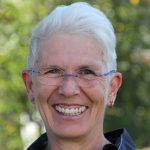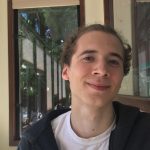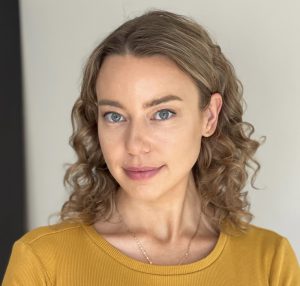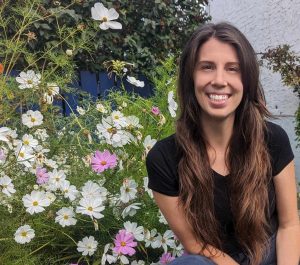 Jodey Castricano is Professor of English & Cultural Studies and Associate Dean of Research and Graduate Studies in the Faculty of Creative Studies. Castricano published three books on the issues germane to critical animal studies: Animal Subjects: An Ethical Reader in a Posthuman World, (Wilfrid Laurier University Press, 2008) and Animal Subjects 2.0 (Castricano and Corman, Eds. Wilfrid Laurier University Press, 2016)). This collection builds on the previous work in the field of critical animal studies and posthumanism, two intertwining conversations that ask us to reconsider common sense understandings of other animals, and what it means to be human. Castricano also co-edited with Rasmus Simonsen to produce and contribute to Critical Perspectives on Veganism, (The Palgrave Macmillan Animal Ethics Series, 2016), a collection that examine the ethics, politics and aesthetics of veganism in contemporary culture and thought. Castricano is Research Fellow at the Oxford Centre for Animal Ethics.
Jodey Castricano is Professor of English & Cultural Studies and Associate Dean of Research and Graduate Studies in the Faculty of Creative Studies. Castricano published three books on the issues germane to critical animal studies: Animal Subjects: An Ethical Reader in a Posthuman World, (Wilfrid Laurier University Press, 2008) and Animal Subjects 2.0 (Castricano and Corman, Eds. Wilfrid Laurier University Press, 2016)). This collection builds on the previous work in the field of critical animal studies and posthumanism, two intertwining conversations that ask us to reconsider common sense understandings of other animals, and what it means to be human. Castricano also co-edited with Rasmus Simonsen to produce and contribute to Critical Perspectives on Veganism, (The Palgrave Macmillan Animal Ethics Series, 2016), a collection that examine the ethics, politics and aesthetics of veganism in contemporary culture and thought. Castricano is Research Fellow at the Oxford Centre for Animal Ethics.
Dr, Castricano gave a lecture as part of the ASRI Distinguished Lecture Series at the University of Victoria on March 16, 2022. Bearing Witness: Animal Loss in the Anthropocene. According to scientific consensus another species is lost every 30 minutes and 70% of wildlife species have already been lost to anthropogenic climate change in the wake of extractivist capitalism. Increasingly, the call to bear witness to animal loss in the Anthropocene has fallen to the environmental humanities and shaped as a response to “the annihilation of millions of our fellow animals.” Such calls to witnessing are based upon the cultivation of “a transformational ethics grounded in empathy and kinship” (Wiseman). However, attempts to bear witness to such loss must inevitably confront the question of How to hold such overwhelming numbers of beings in our minds? How is it possible to bear empathetic witness to mass extinction? This talk seeks to address the challenge to bearing witness through storytelling as a medium of holding space for empathy and kinship, which in this case involves a story of Nietzsche and the unnamed Horse of Turin and Jacques Derrida and his little cat, Logos. Castricano has forthcoming publication “Learning by Heart: Storytelling and Animal Loss in the Anthropocene,” Lost Kingdom: Animal Death in the Anthropocene, Eds. Wendy Wiseman and Burak Kesgin, Vernon Press (forthcoming 2023).
Watch the lecture on the ASRI Media Gallery
 Dr. Shona Harrison is an animal advocate. While her academic specialization is medieval literatures, she also brings critical animal studies and posthumanism to her classes and research. Dr. Harrison has been teaching at UBCO for fifteen years and completed her SSHRC-funded PhD in 2013. She has been the recipient of several Excellence in Teaching awards. Harrison believes the climate emergency cannot end without first ending the animal emergency. The industrialization of animals–that is, the subjugation of non-human sentient beings-for the purpose of turning them into commodities such as food is not only morally bankrupt but is having profound, deleterious environmental impacts.
Dr. Shona Harrison is an animal advocate. While her academic specialization is medieval literatures, she also brings critical animal studies and posthumanism to her classes and research. Dr. Harrison has been teaching at UBCO for fifteen years and completed her SSHRC-funded PhD in 2013. She has been the recipient of several Excellence in Teaching awards. Harrison believes the climate emergency cannot end without first ending the animal emergency. The industrialization of animals–that is, the subjugation of non-human sentient beings-for the purpose of turning them into commodities such as food is not only morally bankrupt but is having profound, deleterious environmental impacts.
To bring about awareness of animal suffering and climate crisis, in 2018 Harrison and Jodey Castricano organized to bring Jo-Anne McArthur, an award-winning Canadian photojournalist and founder of We Animals, to present to students and give a public lecture. In 2019, Harrison and Castricano organized and moderated the film series Welcome to the Anthropocene: Now What? Six documentaries were screened, each followed with a short lecture and public discussion. Their current project, 2023, is Sustainability on Screen, is a series of documentary-screenings and panel discussions.
 Jess Beaudin is a SSHRC-funded second-year student in UBCO’s English MA program in the Faculty of Critical and Creative Studies. Her primary research interests are in Critical Animal Studies and Posthumanism. More specifically, her thesis research examines the ethical disjuncture separating human and nonhuman animal euthanasia practices insofar as what is considered ‘the right thing to do’ markedly differs between these supposed kinds of beings. In particular, she explores these questions in the context of Cormac McCarthy’s The Road and J.M. Coetzee’s Disgrace.
Jess Beaudin is a SSHRC-funded second-year student in UBCO’s English MA program in the Faculty of Critical and Creative Studies. Her primary research interests are in Critical Animal Studies and Posthumanism. More specifically, her thesis research examines the ethical disjuncture separating human and nonhuman animal euthanasia practices insofar as what is considered ‘the right thing to do’ markedly differs between these supposed kinds of beings. In particular, she explores these questions in the context of Cormac McCarthy’s The Road and J.M. Coetzee’s Disgrace.
Jess completed her undergraduate degree at the University of Lethbridge with significant emphasis on Modernist and Contemporary Literature, culminating in an honours thesis project that left her all-consumed with borderwork: posthumanism, transhumanism, critical animal studies, biopower and nectrotechnologies.
 Zach DeWitt (he/him) is an educator, researcher, and writer interested in the intersections of settler colonial history, studies of the Anthropocene and Indigenous ways of knowing. He holds an MA in English from UBCO, where he studied the intersections of Indigenous theory and storytelling. Currently, he teaches Indigenous studies at LaSalle College, on unceded Musqueam, Squamish and Tsleil-Waututh land.
Zach DeWitt (he/him) is an educator, researcher, and writer interested in the intersections of settler colonial history, studies of the Anthropocene and Indigenous ways of knowing. He holds an MA in English from UBCO, where he studied the intersections of Indigenous theory and storytelling. Currently, he teaches Indigenous studies at LaSalle College, on unceded Musqueam, Squamish and Tsleil-Waututh land.
 Eve Kasprzycka is an animal advocate, prison abolitionist, writer and SSHRC-funded doctoral candidate at the University of British Columbia, Okanagan. While living and working on the unceded and ancestral territory of the Sylix/Okanagan people, she teaches in the areas of critical and social theory. Her research bridges theoretical and intersectional perspectives on violence, governance and animals which can be found in Animal Studies Journal (2021, 2023), Building Abolition: Decarceration and Social Justice (2021) and The Routledge Companion to Gender and Animals (forthcoming). She is currently looking at the use of biotechnology in agri-business, de-extinction and bio-medical industries and what genetic engineering can tell us about the climate crisis.
Eve Kasprzycka is an animal advocate, prison abolitionist, writer and SSHRC-funded doctoral candidate at the University of British Columbia, Okanagan. While living and working on the unceded and ancestral territory of the Sylix/Okanagan people, she teaches in the areas of critical and social theory. Her research bridges theoretical and intersectional perspectives on violence, governance and animals which can be found in Animal Studies Journal (2021, 2023), Building Abolition: Decarceration and Social Justice (2021) and The Routledge Companion to Gender and Animals (forthcoming). She is currently looking at the use of biotechnology in agri-business, de-extinction and bio-medical industries and what genetic engineering can tell us about the climate crisis.

Britt MacKenzie-Dale (she/her) holds a PhD in Creative Writing from the University of New Brunswick. Her short fiction has been published in literary journals across Canada, including The Fiddlehead, Prairie Fire, and subTerrain. Her scholarly work has appeared in, or is forthcoming with, Monstrum, The Adroit Journal, and Palgrave Macmillan.
She was longlisted for the 2024 CBC Short Story Prize and was the recipient of the 2023 David H. Walker Prize for fiction. Currently, she is co-editor of The Goose. Her stories utilize multidisciplinary insights and draw upon CAS, sociology, philosophy, and literary/animal narrativity; these stories depict interspecies encounters and entanglements in agribusiness, away from the brightly-lit, sanitized fantasies of farmed animal life on television and the discursive power of the animal industrial complex to render farmed animals as always already food products, and down into the muck, alongside these animals as they labour with and for us on the kill floor, in gestation crates, on family farms, cramped together in transport trucks, and in their final moments. She is the winner of the Okanagan Short Story contest and the UNB Essay Prize. Since 2018, she has been the fiction editor for Qwerty magazine.

Tara Nicholson is a SSHRC-funded PhD candidate and artist with a site-specific, photo-based practice that explores ecological activism through a more-than-human lens. She has exhibited across Canada, including the Art Gallery of Victoria (BC), Modern Fuel (ON), the Burnaby Art Gallery (BC), the Oxygen Art Centre (BC), Parisian Laundry Gallerie (PQ) and at Gallery 44 (ON, 2023) while receiving funding from the BC Arts Council and Canada Council. She attended ‘Earthed’ an international eco-art residency at the Banff Centre (2019) and was awarded the Künstlerhaus Dortmund (DE) Artist-in-Residence Award (2017). Since 2013, she has taught as a continuing lecturer at the University of Victoria and holds degrees from Ryerson University (BA), Concordia University (MFA), and UBC (PostDip).
Nicholson’s PhD research will document Arctic extinction and the erosion of permafrost ecosystems in Greenland, Canada and Russia. In 2022, she was invited to present at the Animals & Landscapes Symposium in Liverpool (UK) and was part of the UBC Okanagan & Exeter University (UK) Initiative (2023) titled ‘Wicked Problems: The Humanities in an Age of Planetary Agenda-Setting.’

Felisha Anderson is an Interdisciplinary Masters student under the theme of Power, Conflict, and Ideas at the University of British Columbia, Okanagan. She completed her undergraduate degree from UBC Vancouver with a major in Philosophy. Her thesis focuses on the “welfarist myth” and the ways in which it reinforces and sustains the institutionalized oppression, violence, and exploitation of human and nonhuman animals within industrialized animal agriculture. Felisha’s research strives to dismantle current normative frameworks by way of intersectional abolitionist theory and veganism.